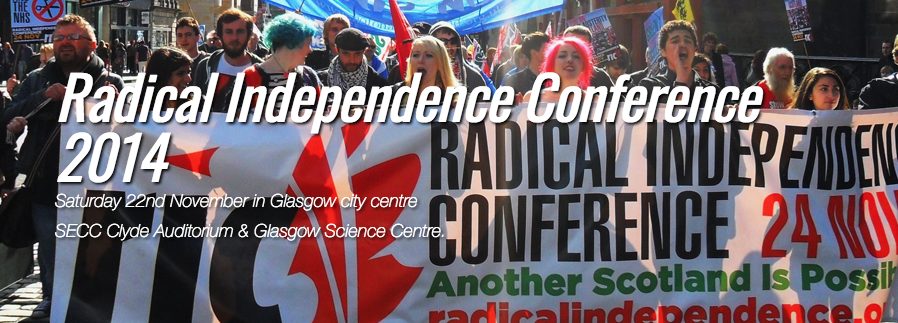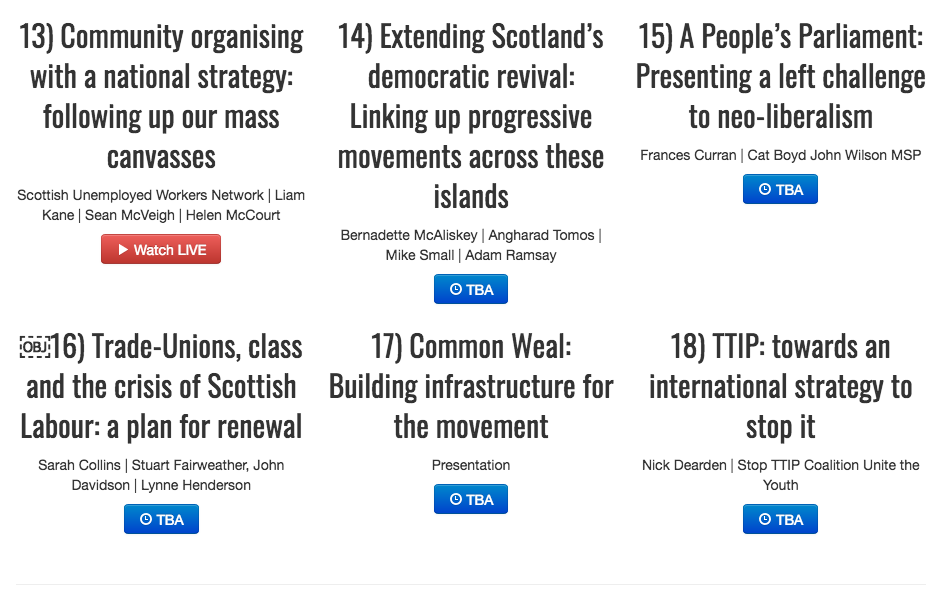Self-Determination: Where We Are, Where We Were


I don’t know about you but I rarely meet someone who I’d consider genuinely ‘wise’. In our squabbles and over-hyped grievance culture wisdom seems like a rare commodity.
In 2014 RIC organised one of several huge congresses that represented the high-point of the Yes movement. They were unprecedented in scale, ambition and scope, bringing together thousands of people in one space, international, dynamic and radical in a way that Scotland had arguably never seen before. The apparent demise of RIC (challenged by some) represents a turning point, a further demise in the unity and optimism of the movement at the very point where we face the opportunity of success. The scale of this ambition, both politically and practically, should be remembered, both as a marker of how far we have fallen, and as an aspiration for where we need to be.
In 2014 I was privileged to be on the same platform as Bernadette McAliskey at an event that if my memory held 3000 people at the SECC in Glasgow. I remember Adam Ramsay being insightful and funny and self-deprecating and McAliskey astonishing me by saying that we – the Yes movement – had embarrassed Sinn Féin into realising the true message of a democratic and peaceful movement for self-determination. You can see the full programme here.
As we stand as a movement riven by division in-fighting and factionalism it’s worth recognising the scale of this success, and the contribution of Cat Boyd and Jonathon Shafi and many many others who organised it, whatever differences you (we) might now have. RIC would go on to not just organise mass-scale events like this but more importantly to organise in housing estates and working class communities across Scotland to engage people who had historically been completely alienated from politics.
The programme was hugely ambitious. Whatever my own contribution was it thankfully wasn’t recorded, but Bernadette McAliskey’s was, and it’s worth recalling so that we can see what was achieved and what can be aspired to.


She was very funny, insightful and inspiring. We should watch her speech here and reflect on what we’ve lost and what we need to reclaim, in whatever form we can. It was a lesson in humanity, unity in diversity, solidarity and vision. She told a story of how the left could work with movements for self-determination and how:
“one of the very big things you have taken back is that the question of self-determination is a fundamental democratic issue … it’s a democratic issue for individuals … the right to self determination is the same question as the right for a woman to control her own body without someone else legislating … the right to self-determination is the same question as workers organising themselves to ensure a fair share of the wealth that their labour produces … I think workers should own the means of production … and I cant get my head round why that’s an ‘extreme’ position … “
The need to re-position Scottish independence as a struggle for self-determination and re-claim it from the petty and the reactionary has never been clearer.
Watch it and consider how far we’ve fallen and what we must retrieve:

This is a great speech
Same old, same old…
‘Self-determination’ is one of those nicely vague flag-waving words around which the troops might be rallied. But what does it actually mean?
In your story about Bernadette, she gives two ostensive definitions: the capacity of a woman to control her own body without someone else legislating (‘autonomy’), and the capacity of workers to organise (‘civil liberty’) in order to win a greater share of the fruits of their labour.
But the subject of the ‘self-determination’ of Scottish independence is neither an individual nor a class, but the state. Nationalism is the doctrine that every nation has a right to be a sovereign state; it says nothing about whether, within that state, individuals will enjoy autonomy and/or civil liberties.
Now, I know the idea is that the Left in Scotland might use the sovereignty of a Scottish state to realise greater autonomy and civil liberty for its citizens. I doubt this is possible; I tend to think that autonomy and civil liberty can only be achieved through the abolition (or ‘sublation’ or ‘deconstruction’) of the state as such, and that ‘power corrupts’.
But this apart, even if it were possible to coerce autonomy and civil liberty through the power of the state, that power would first have to be captured. And given the political decadence of the Left in postmodern Scotland – its deconstruction into a sectarianism of ‘movements’ and ‘identities’, the obsolescence of its industrial socialist patter, and its lack of electoral appeal/cultural relevance to the consumer class of Middle Scotland – it seems unlikely it will capture that power any time soon.
Scotland might or might not become its own sovereign state. But the Left is in no position to turn the struggle for Independence into a revolutionary struggle. To think otherwise is delusional.
It’s you being so cheerful that keeps us all going ,Foghorn !
Great stuff but who are the “petty and reactionary”.
Is it the SNP leadership or those who don’t trust them?
Re the case for independence, the basic and correct sentiment of the man in the street in 2014, or at least 45% of them, was and still is that, “we keep getting Tory governments we don’t vote for, and when we do get a Labour government it’s a fake Labour government which does things like invading Iraq.” The collective output of the pro independence commentariat and all the efforts of the Holyrood political class in the last 6 years have done basically nothing to build upon, elaborate, strengthen, or indeed, weaken that. The polls are high for Yes because of 6 successive years of Tory rule plus the failure of Corbynism plus Brexit. Sturgeon is popular because she has Johnson as a foil. Everything else is detail.
The core thread running through the independence movement at its political best (or at least; least dysfunctional) is class and democracy, ie., social democracy. Step outside of the undemocratic party structures with their cultish leaders, the cultish blogs with their criticisms both valid and spurious. Feel the pulse of the Scottish public. That’s what the “movement” has a mandate to reflect and to implement.
If that’s the sentiment of the man in the street in 2014, gehetacicl, then it was a mistaken sentiment.
The imagined community of the UK, of which the man in the street is a member, collectively elects the government it wants. Collectively, UK citizens elected a Conservative UK government at the last UK elections.
Likewise, the imagined community of Scotland, of which the same man in the street is also a member, also elects the government it wants. Collectively, Scottish citizens elected a Nationalist Scottish government at the last election.
Now, I personally didn’t vote for/want a Conservative UK government or for a Nationalist Scottish government, but that’s neither here nor there; collectively, that’s how the respective electorates voted, and I’ve just got to accept that result as the general will of the respective communities to which I belong.
As I’ve pointed out on another thread, the electorate in my Scottish parliamentary constituency voted solidly Conservative, and yet we still got a government we didn’t want; that doesn’t provide us with a case for independence.
It doesn’t matter who you vote for, the government always gets in. That’s how our parliamentary systems of democracy work. Get over it!
Very impressive speech indeed …..Vital Lessons have to be be learned always. My experience so far on those occasions meeting and marching with INDY supporters going forward together always with familiar good humour and kindred spirit is our vision of the almighty push of ordinary people wise people determined to achieve longed for independence for Scotland Firmly believe we actually will achieve an Independent Scotland despite the ridiculous distressing political dividing shenanigans within or the relentless undermining of The Dirty Tricks Brigade All worrying and disappointing though ..Surely these much admired individuals should spare a thought for those many thousands of good humoured supporters who rely on them to facilitate and 7at least to display unity and harmony in appreciation of the huge unprecedented good spirited support
I was there. I heard Bernadette speak. I remember her saying “When capitalism is in crisis, it starts a war”
I don’t think we have all “fallen far”. I’m still pretty much still the same the person I was then and so, Im guessing, is everyone else. We had something immediate, meaningful and worthwhile to pursue at the time. That is what made us more noble. That’s the difference.
We’ve all been on “standby” too long…no wonder we are squabbling. It is a failure of leadership that is the problem, not a failure of citizenship. Plus, this whole Covid/lockdown shite…it’s as if we are all rotting away. Like over-ripe fruit…stasis…cancelled plans…frustration! And it’s effing winter again. What year is it 2019? ’21? ’20?
I like much of this response Wul! It echoes much of gehetacicl’s .
The fundametnal issue is self-determination – at its most obvious level that means getting the government you vote for, at a deeper level it means citizens (all people who live here) being able to help shape our world.
Where some claim we get the government we vote for, that really isn’ the case in the UK where there is the combination of a media controlled by a few tax dodging Tory supporting billionaires, a uselessly unfair voting system( 42% voting Tory gave them 317 seats, and 40% voting Labour gave them 262 seats), and a House of Lords that means that those rejected are reinstated .
In the 2019 general election to the UK parliament, the Conservatives polled 44% of the popular vote and Labour 32%. This was enough to give the Conservatives 56% of the seats and Labour 31%.
But you’re right: if the constitution of parliament is to better represent the general will of the electorate, we need a globally proportional rather than a geographical allocation of seats.
Such an allocation would also act as a check on any single party capturing the power of government and/or opposition, which would also be good for our democracy since it would ensure as far is possible that both government and opposition were pluralistic rather than majoritarian and, as such, more genuinely representative of the general will.